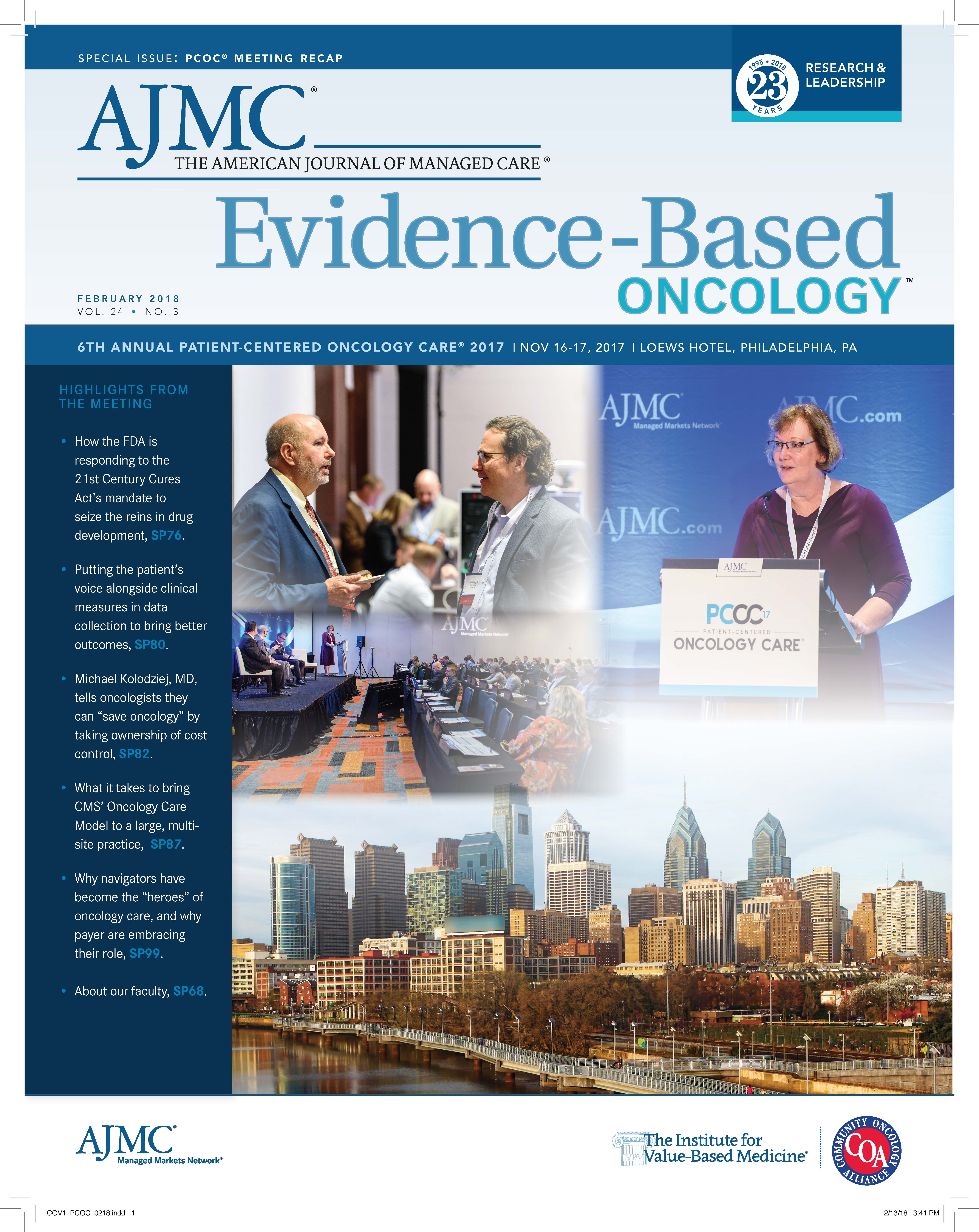- Center on Health Equity & Access
- Clinical
- Health Care Cost
- Health Care Delivery
- Insurance
- Policy
- Technology
- Value-Based Care
Panel Explores Impact of Novel Therapies on Oncology Stakeholders
Coverage of value updates from Patient-Centered Oncology Care, November 16-17, 2018.
In both clinical impact and cost, novel therapies play a significant role for all oncology stakeholders, and experts discussed that impact during Patient-Centered Oncology Care® in Philadelphia, Pennsylvania. The meeting was presented November 16-17, 2017, by The American Journal of Managed Care®.
The panel featured Bruce Feinberg, DO, chief medical officer at Cardinal Health; Thomas Graf, MD, vice president and chief medical officer at Horizon Blue Cross Blue Shield of New Jersey; Kashyap Patel, MD, a medical oncologist and CEO of Carolina Blood and Cancer Center in Rock Hill, South Carolina; and Kavita Patel, MD, MA, a nonresident senior fellow with The Brookings Institute and co-founder of Tuple Health in Washington, DC.
Dr Kavita Patel explained Medicare’s Novel Therapy Adjustment Factor, which is used to avoid penalizing doctors who are being reimbursed through alternative payment models (APMs) if they prescribe a novel therapy. She then explained the 3 issues involved with Medicare’s Oncology Care Model (OCM):
- What constitutes a novel therapy?
- How do we really know what to make of a utilization rate when we don’t really have comparison groups?
- How do the novel therapies apply to the APMs?
Dr Kashyap Patel said that for him, novel therapies are promising, but they come with many complications. He attributed this to the higher cost of care, not only for the cost of therapy itself but also due to the additional time patients must spend with a caregiver. “So, along with trying to reduce hospitalization, plugging numbers into the OCM portal, [and] reporting quality parameters, it’s making things a little harder right now, and we’ll see how it goes over the next 2 to 3 years. But definitely, the novel therapies [have] promise but also [have] complicated the implementation of value- based care in real day-to-day life,” Dr Kashyap Patel said.
Feinberg discussed the Center for Medicare and Medicaid Innovation’s (CMMI) role in novel therapies. He questioned whether CMMI will help align the different stakeholders’ opinions of novel therapies in order to lead to further advancements.
Graf noted the current significance of the term “value” in healthcare and the fact that the meaning differs for every stakeholder. He offered the “episodes approach” for managing costs and quality in oncology. In this approach, multiple bundles would be available for patients and allow them to be stratified so the cost can be assessed.
“But it’s really about the rest of the care that’s critically important and it’s going to determine the outcome for the patients,” Graf explained. “If we can ideally match the patient and their medical needs with the level of resource we deploy, we’re going to minimize the huge increase in costs.”
Furthermore, Feinberg emphasized the need for transparency among stakeholders in order to manage costs and to better understand why other stakeholders make certain care choices. Graf agreed with this concept, while highlighting that trust is required among organizations and patients to produce a successful model of care. Dr Kavita Patel also noted the need for transparency, but called for a “realistic on-ramping for people”—meaning a better understanding of certain healthcare processes among stakeholders.
Said Graf, “If we keep the patients first, and we figure out how to push the money around in the back, we’ll be OK. And so, I think you need a flexible, open, willing payer that’s ready to experiment, that’s willing to understand.” With that, “It’s a great model.”
Dr Kashyap Patel demonstrated the need for transparency by discussing the use of chimeric antigen receptor (CAR) T-cell therapy. He explained that major stakeholders have no way of being prepared for 2-sided risk in the current OCM, especially without any level of transparency. Therefore, 1-sided risk is more comfortable to consider with CAR T-cell therapy because the outcome of the patient would not be compromised.
“So, it’s about really an exploration, and we’re sort of thinking about it the same way we think about transplant, which is, look, we’re going to go in, we know it’s going to be expensive, [but] we’re going to figure it out together,” Graf said in response. “And you need to make a rational margin, we need to pay a reasonable amount, and, if we all agree to that, we can be okay. But, yeah, taking risk when there’s that many unknowns would be crazy.”
The panelists agreed that these types of conversations are important and need to continue around novel therapies in order to produce improvement and changes in healthcare.

Quality of Life: The Pending Outcome in Idiopathic Pulmonary Fibrosis
February 6th 2026Because evidence gaps in idiopathic pulmonary fibrosis research hinder demonstration of antifibrotic therapies’ impact on patient quality of life (QOL), integrating validated health-related QOL measures into trials is urgently needed.
Read More

